
New Hampshire is among the drunkest states in America, according to a new study released in February by SafeHome.org, which ranked NH as the fourth heaviest drinking state in the country. That’s good news for the growing craft brew, wine and spirit companies that have exploded across the Granite State in the past decade, but a concern for public health officials.
The study analyzed the most recent data from the Substance Abuse and Mental Health Services Administration, the Centers for Disease Control and Prevention, the FBI, among others, and found the Granite State ranks first for alcohol consumption per person (4.74 gallons), second for the percentage of adults who drink (67.8%), seventh for per-capita craft breweries (7.6 per 100,000) and 10th for the percentage of adults who binge-drink (30.6%).
It’s little surprise that alcohol-related businesses are booming, along with sales at the state’s liquor and wine outlets (see story on page 46). According to the NH Liquor Commission, NH now has 43 licensed wineries, 15 distilleries and more than 100 breweries, a category that includes nano breweries, brew pubs and other alcoholic beverage makers in a state of only 1.36 million people.
And while there’s some overlap in licensing categories, this represents remarkable growth compared with to a decade ago when NH had 29 wineries, two distilleries and 17 breweries.
And several of the state’s alcohol businesses are in expansion mode. The latest figures for NH wines show sales in 2018 totaled $6.5 million, an increase of $1.1 million over 2017, according to Lewis Eaton, president of the NH Wineries Association and owner of Sweet Baby Vineyard in Hampstead.
And NH actually remains behind neighboring Vermont and Maine in the number of craft breweries per capita. Ironically, the percentage of adults who drink has been falling since 2008, albeit by a fairly small figure, 1.5% between 2008 and 2017.
Bloomberg Business News reported last year that Americans have been drinking less alcohol for each of the past three years, concluding that consumers are drinking less but spending more on higher quality products.
For this reason, most of the craft beverage makers in NH say those with a superior product still have room to grow. But quality isn’t the only key to standing out in an increasingly competitive industry. While there are some veteran businesses in NH, this is an industry of startups.
 And there is infrastructure in place to support this growing industry, including industry groups that have developed in the past few years such as the Granite State Brewers Association and the NH Winery Association. Granite State Growler Tours (Owner David Adams pictured) takes visitors by bus on a tour of Seacoast brewers to sample what craft brewers have to offer. The state is also helping to promote the industry, developing a wine and cheese trail and map as well as a brewery map. In October, the NH Department of Business and Economic Affairs and the NH Brewers Association held an event to celebrate the growth of NH’s beer industry, visiting local breweries and highlighting the economic impact of the industry in the state.
And there is infrastructure in place to support this growing industry, including industry groups that have developed in the past few years such as the Granite State Brewers Association and the NH Winery Association. Granite State Growler Tours (Owner David Adams pictured) takes visitors by bus on a tour of Seacoast brewers to sample what craft brewers have to offer. The state is also helping to promote the industry, developing a wine and cheese trail and map as well as a brewery map. In October, the NH Department of Business and Economic Affairs and the NH Brewers Association held an event to celebrate the growth of NH’s beer industry, visiting local breweries and highlighting the economic impact of the industry in the state.
Among the highlights: NH breweries provide more than 4,000 jobs, $452 million worth of economic output and produce more than 110,000 barrels of craft beer annually.
The Liquor Commission promotes local wines and spirits with dedicated sections in its stores including a rotating selection of local products placed by the registers as well as regular promotional programs including sales, marketing and events.
“New Hampshire is one of the easiest states to start a winery, distillery or brewery in terms of barriers to entry,” says E.J. Powers, a spokesman for the NH Liquor Commission. This includes lower licensing fees, the simplicity of dealing with a single agency and the promise of free storage and shipping of local products that are featured in any NH Liquor and Wine Outlets.
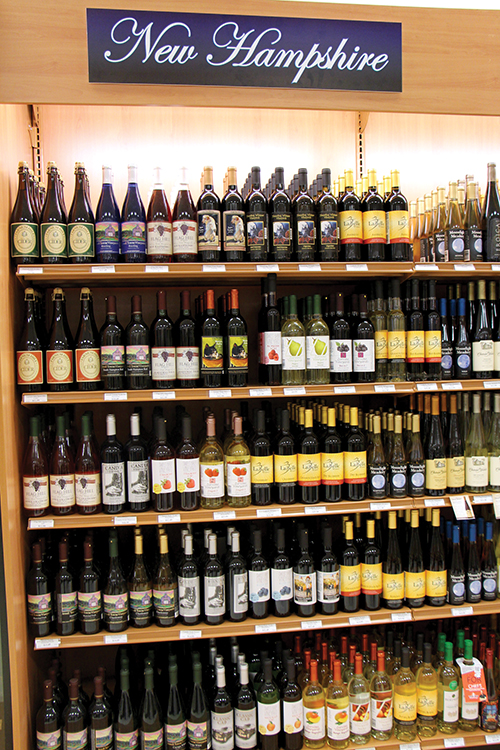 “There’s no minimum sales threshold, no gross revenue requirements,” he says, meaning the volume of an operation doesn’t factor into the decision whether the Liquor Commission will promote it. “We want to have that strong New Hampshire-made section.”
“There’s no minimum sales threshold, no gross revenue requirements,” he says, meaning the volume of an operation doesn’t factor into the decision whether the Liquor Commission will promote it. “We want to have that strong New Hampshire-made section.”
Growing Brands
There are several established brands within the Granite State, and they are expanding to meet demand.
When Amy LaBelle decided to leave her corporate job at Fidelity Investments to start her own winery in 2005, there wasn’t a substantial wine industry in NH, she says. Since then, LaBelle, winemaker and owner of LaBelle Winery, has amassed a mini empire, which includes a winery, restaurant, event center, tasting room, retail store in Portsmouth and her own retail line of wine-related culinary items dubbed The Winemaker’s Kitchen. LaBelle Winery now hosts 300 events annually and sells 15,000 cases of wine annually at its Amherst facility.
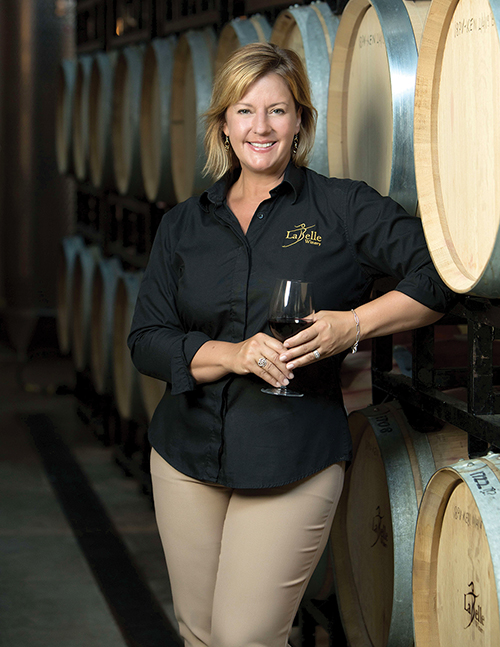 LaBelle (pictured) just won a legal battle to build a new facility on 50 acres she owns across the street. The new 20,000-square-foot facility will house a distillery, tavern, event space, market and barrel barn to age spirits. She plans to have chickens and a cutting garden to sell fresh eggs and flowers at the market, which will also offer pastries, prepared meals and culinary products.
LaBelle (pictured) just won a legal battle to build a new facility on 50 acres she owns across the street. The new 20,000-square-foot facility will house a distillery, tavern, event space, market and barrel barn to age spirits. She plans to have chickens and a cutting garden to sell fresh eggs and flowers at the market, which will also offer pastries, prepared meals and culinary products.
The final price tag for the project is still being worked out but, so far, it’s around $7 million, she says. LaBelle hopes to open the new facility in 2021. "I’ve maxed out our [current] facility,” she says, noting she has more demand for events than she can accommodate and overall sales growth has slowed to about 10% annually. With the new facility, she anticipates sales to grow from $6 million annually to $10 million and they’ll hire 80 to 100 more staff.
As for the increased competition she now faces in the marketplace, LaBelle says, “I think it's great. The more fabulous restaurants, distilleries and wineries the better, … There’s plenty of business to go around. It just makes us work harder.”
Smuttynose Brewing Co. in Hampton was among the first craft brewers to break big in NH, but, after a 24-year run, it found itself on the auction block in 2018 and in foreclosure. The company underwent a major expansion in 2014 at a time when a lot of breweries were launching and found its marketshare diluted. Under new leadership, the brewer is once again growing. It ranks near the top for fastest growing sales among craft brewers in New England, says Andrew Hart, director of Hospitality for Smuttynose.
It opened Smuttlabs Brewery & Kitchen, a 5,000-square-foot innovation incubator for craft beers, in downtown Dover in late 2019. Smuttlabs seats 120 and features a 42-foot bar, and 13 rotating limited-batch draft beers.
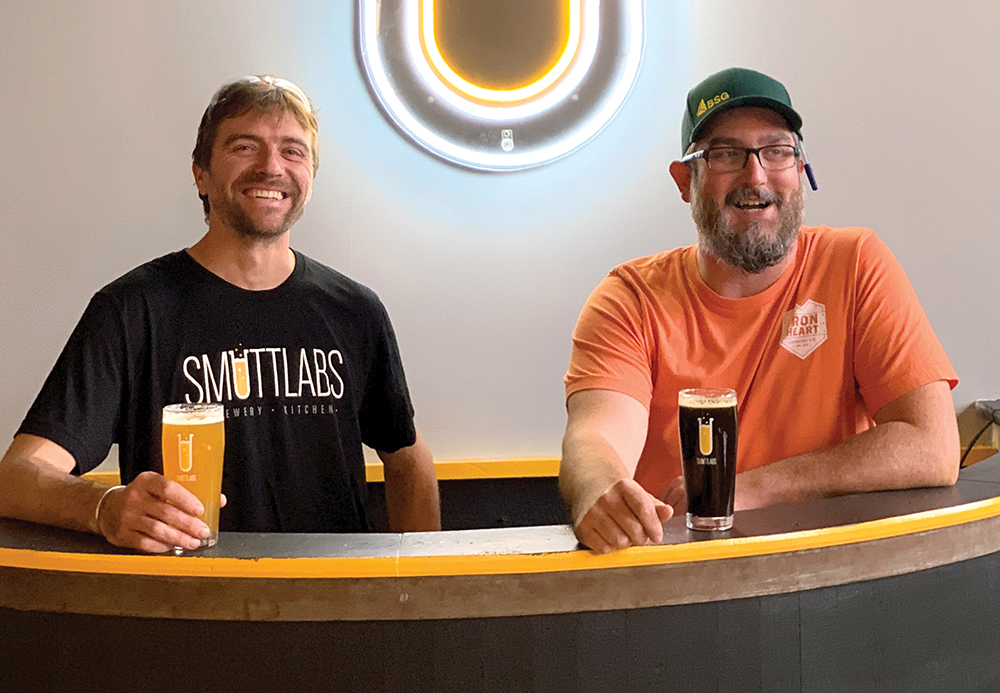
Left: Tyson Demers, assistant brewer; and Charlie Ireland, head brewer at Smuttlabs Brewery & Kitchen in Dover. Courtesy photo.
Moonlight Meadery in Londonderry has won awards and is the largest production winery in NH, producing more than 1,000 cases per month, which are shipped across the U.S. and to countries including Australia, Canada, Japan and Hong Kong. (The NH Wineries Association confirms Moonlight is the largest based on 2018 figures.) Michael Fairbrother, owner and head mead maker, also operates a small tasting room.
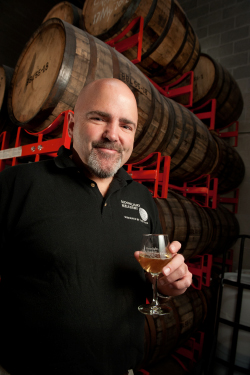 “We’re not even close to reaching capacity,” Fairbrother (pictured) says of sales opportunities. “It’s really an untapped market.”
“We’re not even close to reaching capacity,” Fairbrother (pictured) says of sales opportunities. “It’s really an untapped market.”
Like many in the craft alcohol industry, he came to this business following his passion. He’d spent 25 years as a brewing hobbyist and observed “nobody was making the kind of beverages that I liked to drink, like mead.”
A former software executive, he launched the business about 10 years ago and is now one of three meaderies statewide, though he has also expanded into ciders and beer, including what’s known as a braggot that is produced using honey. While the barriers to entry into craft brewing aren’t too high, “the problem is how to make a living.”
In Fairbrother’s case, he’s not just competing locally, but globally. “You need to understand the finances of it,” he says and relies on his knowledge from years as a business executive. To sell in volume requires distribution, and expanding his distribution continues to be a major focus.
Another sign of the continued growth of craft alcohol industry is Hobbs Brewing Company in Ossipee, which opened in 2014, and has shifted into overdrive in the past year. Its brewpub is attached to a brewing facility that produces 31,000 gallons of beer annually. It is building a second production facility, slated to open this summer, that will dramatically increase its capacity. Hobbs also launched a new brewery in Belize in March 2019 to produce IPAs in the Caribbean market.
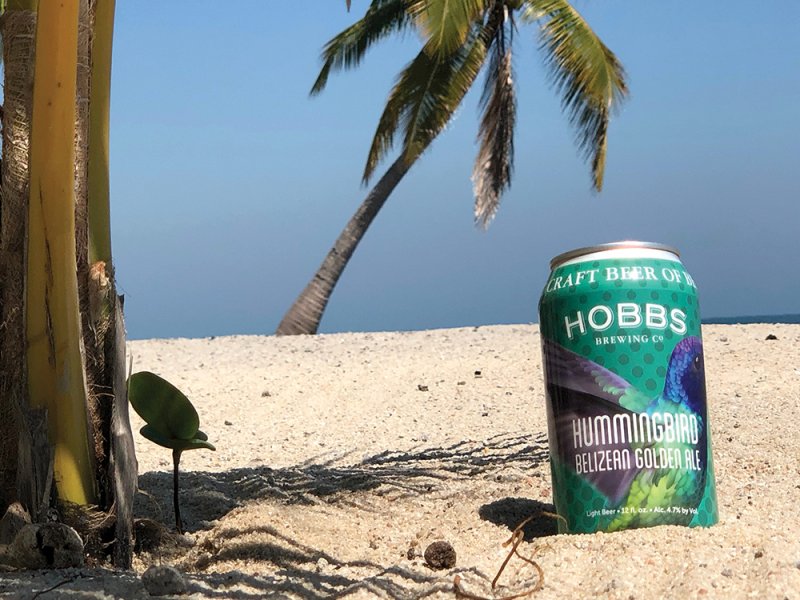
Hobbs Brewing Company's IPA for the Caribbean market. Courtesy photo.
Seven Birches Winery at RiverWalk Resort at Loon Mountain, which began producing wine commercially a decade ago, is also embarking on a major expansion, says owner and winemaker Marc LaClair. “We’re at production capacity. In order to grow, we need more space. We are always selling out.”
Seven Birches Winery relocated from North Haverhill to RiverWalk in 2016 and saw 100% increase in sales, LaClair says. “We saw a growth opportunity to bring our product to the tourism market in Lincoln. It was the best decision we made so far.”
The winery, which has a tasting room at RiverWalk, opened a second retail location in the Lincoln village shops area in 2018.
The second phase of construction for its production facility at RiverWalk is slated to begin this summer, increasing the winery from 2,000 to 10,000 square feet. It will substantially increase the amount of wine it produces. Seven Birches Winery currently produces 3,000 cases annually, which still places it among the five largest wineries in NH, LaClair says.
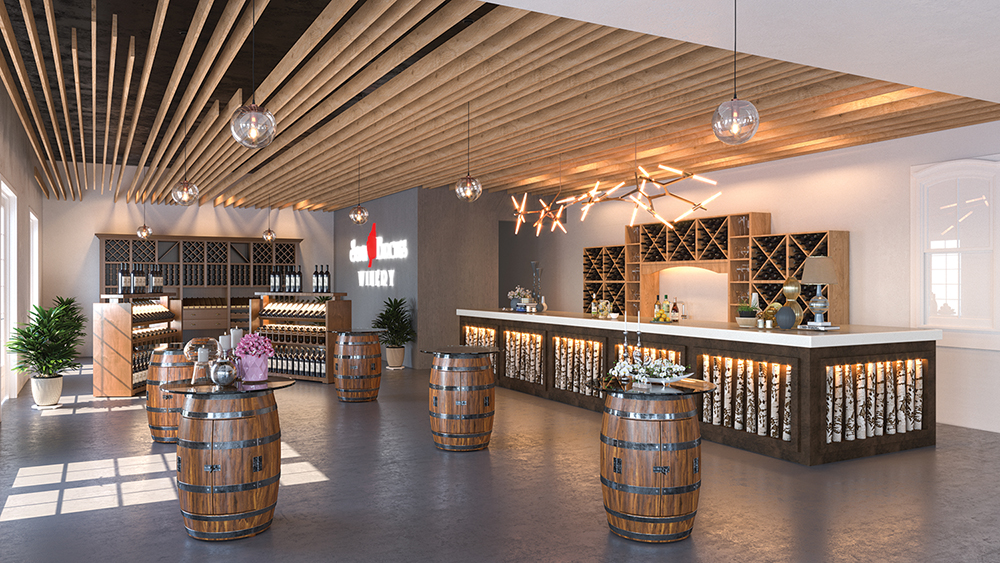
The planned tasting room expansion at Seven Birches Winery. Courtesy photo.
“That will give us the space we need to increase capacity to meet demand. That will also allow us to get to 10,000 cases a year of wine and other products we will be announcing soon,” LaClair says, adding the winery is considering branching out into hard cider. “It is in the same category of beverage we create now. It’s just a smart move. There’s a real growing demand for cider. It’s an alternative to beer,” he says. “It’s an area we can get into with minimal changeover in equipment.
It’s less of an investment than distilling or brewing beer. It’s an obvious area for us to expand.” The winery also recently planted its first test vineyard in the backyard of RiverWalk Resort.
Sobering Changes
The good times can’t roll on indefinitely. Since starting his winery in 2008, Eaton of Sweet Baby Vineyard has seen his competition roughly quadruple. But he’s also starting to see the first wave of retirements. Jewell Towne Vineyard’s Peter Oldak recently retired and closed the business in South Hampton. Others who started wineries as their second careers are expected to do the same.
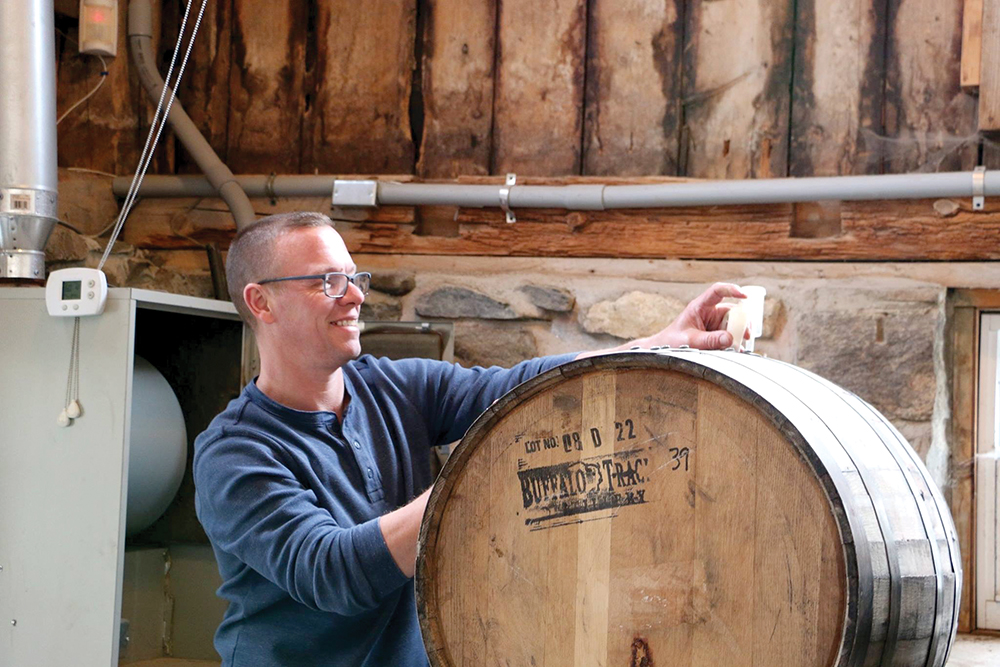
Lewis Eaton, owner of Sweet Baby Vineyard. Courtesy photo.
New players may enter the market, but others will close or change hands so the total number may not vary much, he says.
“Wineries are a different animal. It takes a long time to build an inventory,” he says. Growing wine grapes can take years because vines must get established before they produce wine-quality fruit. In addition to the lag between planting and harvesting, wines typically require aging. As a result, winemakers need a longer horizon.
New Hampshire also has seen turnover among craft brewers. While Smuttynose survived a bank auction two years ago, other small breweries have folded. The state lists 40 active nano breweries, for example, but lists another 18 that went out of business or sold.
That kind of turnover is likely to continue, but that doesn’t mean overall growth can’t continue, industry leaders say.
Among those that have survived an ownership transition is Flag Hill Distillery and Winery in Lee. Brian Ferguson took over Flag Hill from founder Frank Reinhold in 2015. He added four acres of Cayuga white grapes in the past couple of years and cleared another five acres last year to increase the amount of La Crescent, a hybrid grape that shows promise for the NH climate, and produces a highly aromatic wine, he says. But it’ll be three or four years before he’ll get grapes off those vines and another year after that before the grapes are of a quality to make “great” wine, he says.
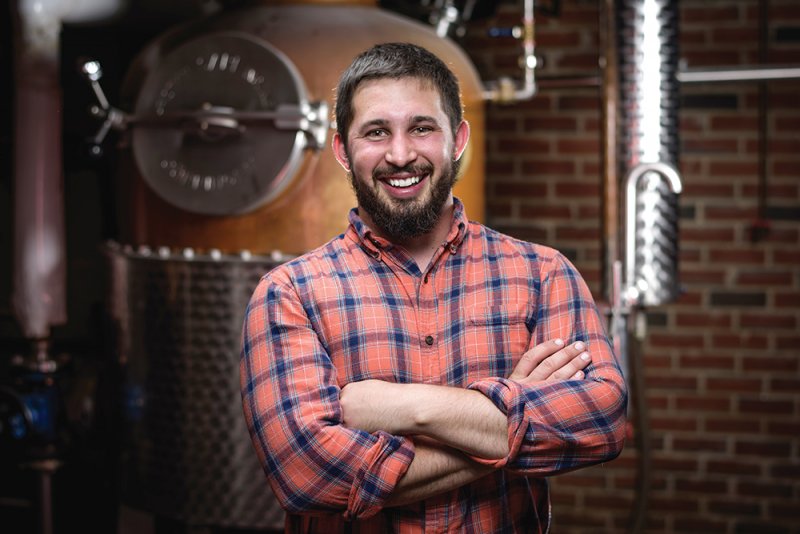
Brian Ferguson, owner of Flag Hill Distillery and Winery. Courtesy photo.
In the meantime, Ferguson is expanding the business in other ways, building 20 villas with a partner on adjacent land that will host up to 80 guests a night. Ferguson has also increased whiskey production.
He says the more people growing grapes and making good wines in NH, the better. To the extent that NH can attract expertise and create high quality wines, the state can create the kind of excitement that spawns a Sonoma or Finger Lakes region, he says. That’s the kind of growth that benefits everyone in the industry.
Hot Startup Culture
As the numbers demonstrate, there has been an explosion in NH’s booze business, which means plenty of startups on a growth trajectory. Ancient Fire Mead and Cider in Manchester launched in 2018, building a following with a comfortable tavern experience in which to enjoy its offerings. “We have a lot of regulars on Thursday and Friday nights,” says owner Jason Phelps. Saturdays draw more newcomers, “because they’re out looking for something interesting to do.”
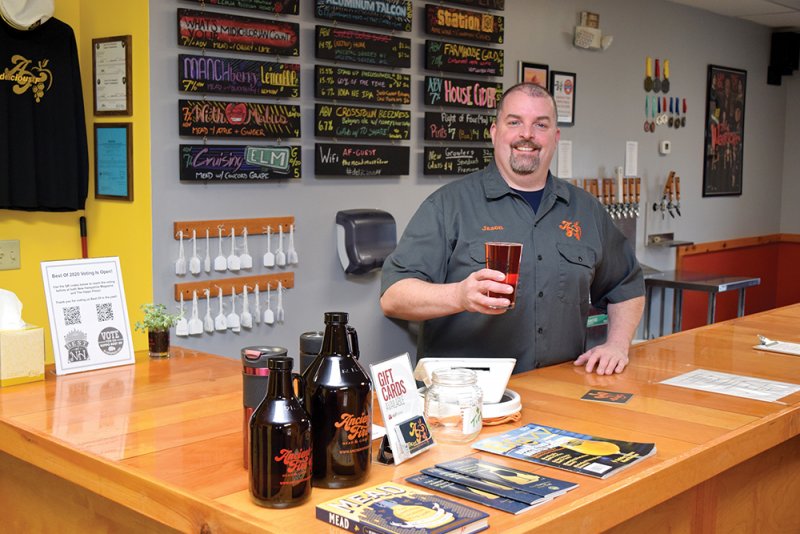
Jason Phelps, owner of Ancient Fire Mead and Cider. Photo by Christine Carignan.
In this, he says his business benefits from a lively ecosystem of small breweries in Manchester. Millennials like to experiment; they like local products and ingredients. The large beer manufacturers like Anheuser Busch are taking a hit as more young beer drinkers decide they want to know the owners and brewers they buy from. They may be drinking less, but they are more discerning and more willing to try different products, Phelps and other brewers say.
“It’s getting tighter. It’s obvious to everyone, but it’s not at saturation,” he says. Phelps says his many years as a hobbyist, refining his skills and developing recipes, gave him confidence and allowed him to focus more on creating a good experience for visitors, providing a honey tasting bar, among other things, to show visitors how different kinds of honey translate into different kinds of mead.
Cities and towns are thirsty for these businesses, seeing them as a vital part of attracting a younger generation of workers. In October, the city of Rochester awarded a $45,000 JOB Loan to Peter LaPlante to help him launch Back Hill Brewery Company in the Gonic Mill.
“Breweries have been popping up everywhere, and Rochester had not a one. We were actively looking for a brewery for several years,” says Rochester Economic Development Specialist Jenn Marsh. “This is where people are gathering and want to visit. A brewery is a great way to draw in a certain demographic.” Back Hill Brewery Company is expected to open this spring.
Another startup in the state is also gaining traction. NOCA Beverages, launched last year by three UNH graduates, produces a 95-calorie, cold-brewed, non-carbonated alcoholic beverage in three flavors that’s now sold in more than 600 stores in NH and Massachusetts. NOCA produced 4,000 cases in its first run, expecting that would carry them through the summer. But, within six weeks, the product was sold out and the second production run was twice the size.
Richard Roy, one of the founders, says by April, NOCA will expand sales to the rest of New England, placing it in more than 1,000 stores. NOCA, headquartered in NH, has opened an office in Boston, hired a sales rep for the Massachusetts territory and is hiring a second to service Connecticut and Rhode Island.
Connecting With Patrons
The importance of a close relationship to customers is vital to the experience at Throwback Brewery in North Hampton. Co-founder and President Nicole Carrier says there’s a lot of competition in retail in the fight for shelf space. But a small brewer can be successful using a “tavern” model if they create great products, a nice place to gather and build a strong community, including partnerships with other small businesses in their area.
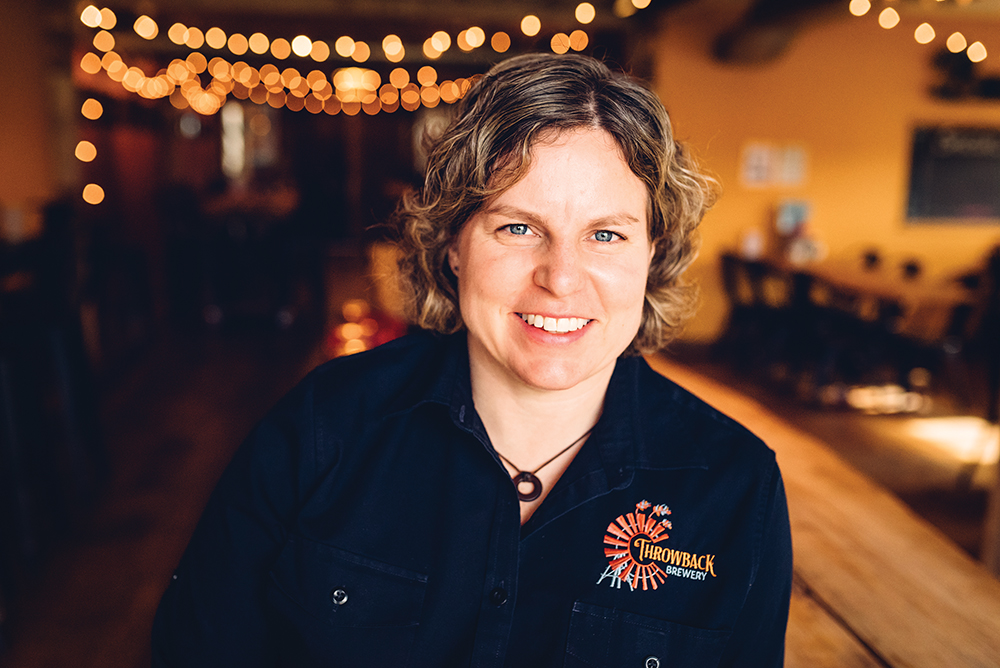
Nicole Carrier, co-founder and president of Throwback Brewery. Courtesy photo.
“I love the size we’re at,” she says. Expansion for her would ideally involve bringing more people to the brewery and tap room rather than fighting for shelf space in stores.
David Adams, founder of Granite State Growler Tours, says many small brewers succeed by putting a modern twist on the colonial tavern, serving as a center for people to gather and relax. “You need people to come to the brewery and buy your beer and buy your food and spend money in your [taproom],” he says. As part of the craft beverage tourism industry, Adams says he introduces people to the breweries in their area “so they can find their new favorite place to hang out.”
Offering an array of good beers is only part of the attraction. Breweries need knowledgeable staff and people who are passionate about their products. But if a brewer can create that “tap room magic,” Adams says, then that gives them an edge.
Expanding into Spirits
Distilleries are also on the rise. There are 15 in the state, some of which are expanding, and more to come.
Christopher Burk, a businessman from Denmark, Maine is planning to build and open an organic distillery in North Conway called Cathedral Ledge Distillery. His plans received conditional approval by the Conway Planning Board and call for a 4,336-square-foot distillery with a tasting room. Future phases could include a barrel storage barn and the option to expand the main building by another 864 square feet. He hopes to break ground this spring.
But Burk says he will start small and grow. He is not trained as a distiller, though he’s studied the process, so he plans to hire someone to handle the distilling while he manages the business. And though he did not do a formal marketing study, he believes there’s room for Cathedral Ledge to be successful, noting that places like Washington State are home to many more distilleries than NH.
“First and foremost, we want to be local, using local products, selling them locally,” he says. He’ll start with vodka and gin, then move into whiskey and bourbon, which require time to age. “The focus is really on the ingredients,” he says.
Burk has already been in touch with the NH Liquor Commission and says he is encouraged about the support he expects
to receive.
LaBelle Winery is now entering the spirits market with plans to open a distillery in 2021 to make bourbon, brandy, vodka, rye whiskey and gin.
LaBelle is far from the first winery to expand into distilling. Flag Hill opened the state’s first distillery since prohibition years ago. Distilled spirits face different challenges from wine and beer, which buyers can consume a bottle or more over a meal with friends. Distilled spirits are savored in smaller quantities or in mixed drinks so a single high-end bottle lasts much longer and is purchased less frequently. As a result, a much larger customer base is required to support distilling, Ferguson says.
This means developing strong distribution networks, not just local sales at a tasting room, which in turn makes expertise in packaging and marketing important, he says.
To complicate matters, not all distilled spirits have the same buyers. Gin drinkers can be loyal to their favorite brand while whiskey drinkers are like craft beer drinkers in terms of trying new things, he says.
Ferguson says if any part of the industry in NH is at or near saturation, it’s the distilleries. The financial barriers to entry are higher given the cost of a high quality still. The expertise needed is greater, and it can be a surprisingly demanding job both physically and mentally.
“There’s not a lot of room to become millionaires from distilling,” he says.
However, spirit producers are finding ways to expand their market. Fabrizia Spirits, a maker of Limoncello in Salem, expanded its manufacturing space from 1,800 to 6,000 square feet in 2019 to accommodate demand for its line of canned cocktails launched in 2017.
“It was a great boost for sales. This past year we sold $800,000 worth of canned cocktails that two years ago didn’t exist. That has been explosive,” says Phil Mastroianni, co-owner and founder. “We had been growing the Limoncello company by 20% a year.”
Sales of the canned cocktails shot from 800 cases in 2017 to 34,500 cases last year, and Mastroianni expects that trajectory to continue as he rolls out new flavors and products.
“We have a thriving spirits industry in NH,” he says. “The longer we stay in the game and collaborate, the more share we take away from the big guys.”
 The Downside of Expansion
The Downside of Expansion
Not everyone sees the expansion of the state’s alcoholic beverage industry as a positive thing. The more widely alcohol is promoted and the more easily it is made available, the greater the risk for alcohol abuse.
Substance abuse costs the state an estimated $2.36 billion a year, including $1.56 billion in lost productivity due to alcohol-dependent workers and labor force nonparticipants, according to Kate Frey, vice president of advocacy for New Futures, a nonprofit health advocacy organization.
As the state has changed regulations to boost the industry, she sees a downside. When alcohol can be promoted and sampled at local farmers markets, for example, young families are potentially exposed to the sales pitch. In addition, tight state budgets mean that funds designated for prevention, treatment and recovery continue to get diverted to other areas.
She maintains the state needs to balance these needs and costs against the revenue that alcohol generates.

 Current Issue - April 2024
Current Issue - April 2024